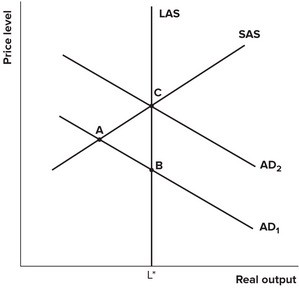What is meant by aggregation? Why is aggregation important for macroeconomic analysis?
What will be an ideal response?
Aggregation refers to the process of adding together individual economic variables to obtain economywide totals. Aggregation distinguishes microeconomics from macroeconomics. It allows us to study the economy as a whole, rather than looking at its individual parts.
You might also like to view...
An expansionary monetary policy, all else equal, will:
A) depreciate the domestic currency. B) appreciate the domestic currency. C) all of the above. D) none of the above.
Suppose that a worker in Country A can make either 25 bananas or 5 tomatoes each year. Country A has 200 workers. Suppose a worker in Country B can make either 18 bananas or 6 tomatoes each year. Country B has 400 workers. Two possible consumption bundles that Country A could produce are:
A. (5,000 bananas, 1,000 tomatoes) and (1,000 bananas, 5,000 tomatoes) B. (5,000 bananas, 0 tomatoes) and (2,500 bananas, 500 tomatoes) C. (2,500 bananas, 500 tomatoes) and (1,250 bananas, 800 tomatoes) D. (2,500 bananas, 750 tomatoes) and (1,250 bananas, 750 tomatoes)
Which market structure(s) is(are) imperfectly competitive?
Refer to the graph shown. An economy is in short-run equilibrium at point(s):
A. A only. B. B. C. C only. D. Both A and C.